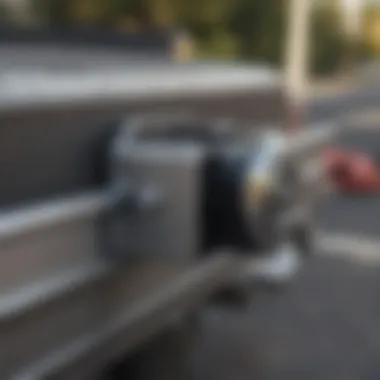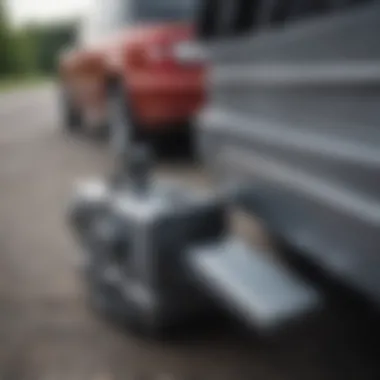Mastering Tow Hitch Lock Boxes for Ultimate Security


Intro
Tow hitch lock boxes serve as crucial accessories for towing enthusiasts and those who depend on towing equipment for work or recreation. Understanding their design and functionality is paramount to enhancing the security of valuable assets. By diving into various aspects of tow hitch lock boxes, this guide aims to provide both automotive aficionados and prospective buyers with the insights needed to make informed decisions. Security is not just a matter of convenience; it's about protecting your investments and ensuring peace of mind while on the road.
The following sections will explore the significance of these lock boxes, covering key features, installation processes, and compatibility with diverse towing setups. The evolution of technology will also be discussed, highlighting how it has shaped the design and utilization of tow hitch lock boxes. With this knowledge, you will feel equipped to navigate the market effectively and select the right product for your needs.
Vehicle Review and Assessment
Overview of Specifications
Tow hitch lock boxes come in various shapes and sizes, which can affect their suitability for different towing applications. Understanding specifications such as material quality, dimensions, and weight capacity is essential. Most lock boxes are crafted from durable materials like steel or aluminum to withstand harsh environmental conditions.
Performance Metrics
Performance metrics primarily focus on how well a lock box secures the tow hitch. This includes resistance against tampering, durability over time, and the effectiveness of the locking mechanism. Look for features such as weatherproof locking systems and corrosion-resistant coatings when evaluating options.
Interior Features and Comfort
While interior features may not be as critical for a lock box, the design can influence the ease of access and storage capabilities. Some lock boxes provide compartmentalized sections, enabling better organization for towing accessories. Check dimensions to ensure compatibility with your hitch assembly and towing needs.
Safety Ratings and Features
Safety ratings for lock boxes are not as standardized as vehicles. However, the quality of locking mechanisms and materials are indicators of safety. Look for encryption-based locking systems or deadbolts for enhanced security. This helps ensure that valuables are protected from theft.
Fuel Efficiency and Environmental Impact
Although tow hitch lock boxes do not directly affect fuel efficiency, their weight and aerodynamics can. Choosing a lightweight option can minimize impact on vehicle performance, leading to better fuel efficiency. Moreover, eco-friendly manufacturing practices can contribute positively to the environment and appeal to eco-conscious consumers.
Test Drive Experience
Driving Dynamics and Handling
Though one does not typically “drive” a tow hitch lock box, the dynamics of towing with one installed should not be overlooked. A poorly designed lock box may alter the handling characteristics of a tow setup, leading to instability while driving.
Comfort and Ergonomics
Accessing the lock box needs to be convenient, especially if it’s used frequently. Design ergonomics play a role in how users interact with the equipment. A box with a user-friendly locking mechanism can reduce frustration during usage.
Noise and Vibration Levels
A lock box may introduce additional noise or vibrations while towing. Opt for models designed to minimize rattling or shifting to ensure a quieter, more comfortable ride.
Performance in Varying Conditions
Evaluate how a lock box performs under different weather conditions. High-quality models often withstand extreme temperatures, rain, and snow without compromising security or functionality.
Real-world Usability
Consider how easy it is to use the lock box in your daily towing scenarios. A model that allows for quick access and straightforward operation will be of greater value during practical use.
Comparison against Similar Models
Side-by-Side Specification Comparison
Exploring various models side-by-side can reveal distinct differences in terms of size, weight capacities, and locking mechanisms. This is crucial for identifying the best fit for your vehicle and towing needs.
Pricing Analysis and Available Packages
Pricing for tow hitch lock boxes can vary significantly. Thorough pricing analysis is necessary to discover which models offer the most value. Look for bundled packages that may offer extra equipment or accessories along with the lock box.
Unique Selling Points of Each Model
Each model may have unique selling points that cater to different consumer preferences. Some may prioritize security features while others may focus on weight or ease of installation.
Customer Perception and Brand Loyalty
Customer reviews play a vital role in understanding real-world performance. Investigating brand loyalty can provide insights into reliability and user satisfaction levels, which heavily influence purchasing decisions.
Resale Value Projections
Some lock boxes retain value better than others. Understanding the resale potential of a model can be an additional factor in making a purchase decision.
Automotive Technology Trends
Current Innovations and Features
Tow hitch lock boxes are evolving due to advancements in technology. Innovations such as smart locking systems enable users to control access remotely through mobile applications.
Impact of Technology on Driving Experience
Technological advancements enhance the driving experience by providing peace of mind and convenience. Smart technologies allow for immediate alerts if unauthorized access is attempted.
Future Trends in Automotive Tech


Future developments may include integration with vehicle systems, allowing for better tracking and monitoring of towing setups. Expect to see more connected devices within the automotive accessory marketplace.
Case Studies on Technology Implementation
Certain prominent brands have successfully implemented technology into their lock boxes, showcasing enhanced security features and usability benefits. These case studies can serve as a reference point for emerging trends.
Consumer Reaction to Tech Advancements
Understanding consumer reactions to these technological advancements serves as a measure of market demand and acceptance. Monitoring feedback can guide manufacturers in development and marketing strategies.
Car Maintenance Tips
Essential Maintenance Checklists
While tow hitch lock boxes are generally low-maintenance, periodic checks for rust or functional issues are necessary. Simple checklists can ensure longevity and reliable operation.
DIY Maintenance Guides for Owners
Basic maintenance tasks can often be performed at home. This may include lubrication of locking mechanisms or cleaning surfaces to prevent corrosion.
Recommended Service Intervals
Establishing a schedule for maintenance inspections can prolong the lifespan of the lock box. It’s wise to perform checks at least every season, especially before high-usage periods.
Common Issues and Solutions for Specific Models
Being aware of common issues that may arise with specific lock box models can save time and headaches. Researching complaints from previous customers can offer solutions and preventative measures.
Understanding tow hitch lock boxes requires keen attention to detail. Whether it’s selecting the right model or performing maintenance, informed decisions lead to better security for your investments.
Preamble to Tow Hitch Lock Boxes
Tow hitch lock boxes serve a critical function in the world of towing. As we explore this subject, we can grasp their necessary role in securing trailers and other towed vehicles. The lock box acts as a barrier against theft and protects valuable equipment. Understanding these systems can influence your experiences, whether you are a frequent traveler or an occasional user of towing equipment.
Definition and Purpose
Tow hitch lock boxes are metal containers designed for secure storage on a vehicle’s hitch. These boxes lock into the hitch receiver and provide a safe space for various items, such as tools or towing accessories. Their primary purpose is to safeguard these belongings while you are away from your vehicle. Additionally, they often serve to prevent unauthorized access to the vehicle's hitch and wiring systems, which can be vulnerable during operation or when parked.
Properly installed, a tow hitch lock box offers peace of mind by ensuring that essential items remain secure while in transit. Furthermore, having such a system can sometimes be a legal requirement for specific towing arrangements. Hence, the relevance of understanding these products extends beyond security; it also integrates with regulatory compliance and responsible towing practices.
Importance of Security in Towing
Security is central to any towing operation. Theft of trailers or equipment can lead to substantial economic losses and complications for both individuals and businesses. Thus, tow hitch lock boxes are instrumental in the defense against such threats. When on the road, a securely locked box minimizes the risk of opportunistic theft.
Moreover, a robust lock system is a deterrent. The presence of a tow hitch lock box may dissuade potential thieves, knowing that gaining access to equipment will require time and effort.
In summary, understanding tow hitch lock boxes isn't only about knowing what they are; it is about recognizing their role in enhancing overall security. This understanding enables users to make informed decisions about which lock box to use based on their specific needs and the level of security they require. The subsequent sections will dive deeper into the various types of tow hitch lock boxes, exploring their features, installation processes, and other crucial factors that influence their effectiveness.
Types of Tow Hitch Lock Boxes
Tow hitch lock boxes serve an essential role in the towing equipment landscape. Understanding the various types available can significantly affect your choice. The right lock box can improve security, increase convenience, and enhance the towing experience.
Standard Lock Boxes
Standard lock boxes are designed for everyday use. They generally feature a simple locking mechanism, which is efficient for quick access and practicality. Made from durable materials, they are resistant to rust and corrosion, making them suitable for various weather conditions. These lock boxes often fit most standard towing applications, providing adequate security without requiring complex installation processes.
Key Benefits:
- Affordable and widely available
- Easy to install and use
- Sufficient security for typical towing scenarios
Standard lock boxes might lack some advanced features seen in other types. However, they are highly functional and serve their purpose well for most users.
Recessed Lock Boxes
Recessed lock boxes offer a unique design that provides an added layer of protection. They are installed into the frame of the hitch, which makes them less accessible for potential thieves. This design doesn't protrude far from the hitch, giving a clean look while also minimizing theft risk.
Considerations:
- They can require more precise installation, possibly needing professional help
- Suitable for users who prioritize security in urban environments
- May not be compatible with all vehicle types, so checking fitment is important
The recessed design can be especially beneficial for individuals who frequently park their vehicles in public spaces. It combines both security and aesthetics.
Heavy-Duty Lock Boxes
Heavy-duty lock boxes are the most robust option available. They are engineered for intense use, often found in professional towing and transport scenarios. Made from high-grade metal or composite materials, these lock boxes can withstand the most challenging conditions.
Advantages include:
- Superior durability and resistance to impacts
- Advanced locking mechanisms, such as those utilizing electronic or biometric technology
- Ideal for heavy loads and high-frequency use
While these options come at a higher price point, for users who require maximum performance and reliability, heavy-duty lock boxes represent a worthwhile investment.
For enthusiasts looking to protect valuable towing equipment, the choice of lock box type can make a significant difference in overall security and functionality.
Key Features of Tow Hitch Lock Boxes


Tow hitch lock boxes serve as crucial tools for securing trailers and equipment during transport. Understanding their key features can significantly impact your towing experience. These features directly influence safety, durability, and convenience, which are essential for any towing application. Investing time in assessing these elements ensures you choose a lock box that meets both your needs and expectations.
Material Quality
The material quality of a tow hitch lock box is paramount. Typically made from metals like steel or aluminum, the strength and durability of the material affect the lock box's ability to withstand physical damage and resist wear over time. Steel is often regarded as the superior option, as it offers higher tensile strength and greater resistance to cuts and abrasion. Aluminum, while lighter, can dent more easily under impact but is resistant to rust. Choosing the right material is crucial for ensuring longevity and effectiveness.
When evaluating material quality, consider the following:
- Durability: Assess how the material performs in varying weather conditions.
- Weight: Heavier materials may provide more security but can also add weight to your tow setup.
- Corrosion Resistance: Look for treated or coated metals that prevent rusting.
Lock Mechanism Types
The security of a tow hitch lock box largely depends on its locking mechanism. Various types of lock mechanisms exist, each offering different levels of protection. Here are some common types:
- Pin Locks: Simple yet effective, pin locks can be secured with a key. However, they may be vulnerable to lock picking.
- Disc Locks: This design provides greater security. Disc locks are resistant to bolt cutters and saws, making them a preferred choice for heavy-duty applications.
- Combination Locks: These locks allow users to set their own code, which can be convenient but may be less secure if the code is shared.
Selecting the right locking mechanism is vital. Take into account the level of security needed and whether the mechanism aligns with your personal preference.
Weather Resistance
Weather resistance is another critical feature of tow hitch lock boxes. Exposure to elements can lead to corrosion and degradation over time. A quality lock box should protect against moisture, UV radiation, and extreme temperatures. Many manufacturers apply special coatings or treatments designed to enhance weather resistance.
Key aspects to consider include:
- Seal Design: Look for a lock box with a seal that prevents water entry.
- Treatment Options: Verify if the materials have undergone treatments that enhance weather durability.
- Testing Standards: Research whether the product meets recognised standards for environmental exposure.
Understanding these key features will help you make an informed choice when selecting a tow hitch lock box. Being mindful of the material quality, lock mechanism types, and weather resistance can make a significant difference in ensuring your towing security is as robust as possible.
Installation Process
Understanding the installation process of tow hitch lock boxes is crucial for ensuring their effective use. A correct installation maximizes security and functionality. This section will guide you through the necessary steps and considerations, providing the insight you need to install a tow hitch lock box with confidence.
Tools Required
Proper tools are essential for a smooth installation of your tow hitch lock box. Having the right equipment saves time and prevents frustration. Here’s a concise list of tools commonly required:
- Socket wrench set: Ideal for tightening bolts.
- Drill: Necessary if you are mounting the lock box to a surface.
- Screwdriver set: For securing screws properly.
- Measuring tape: Ensures accurate placement.
- Safety goggles: Protect your eyes during the installation.
Before starting, gather these tools. This preparation helps keep the process efficient and streamlined.
Step-by-Step Installation Guide
Following a systematic approach during installation is vital. Below are detailed steps for installing a tow hitch lock box:
- Choose the Right Location: Select a suitable spot for installation, typically near the hitch area.
- Measure Twice, Cut Once: Use the measuring tape to confirm dimensions for alignment. Make marks for reference.
- Prep the Area: Clear any obstructions and clean the area where the lock box will be installed.
- Attach the Lock Box: Align the lock box according to your measurements and secure it using screws or bolts. If required, use the drill for creating holes.
- Tighten Securely: Ensure all bolts and screws are tightened properly to prevent movement.
- Test the Lock Mechanism: After installation, check the lock box by trying to secure and unlock it several times. This ensures everything functions as it should.
Each of these steps contribute to a secure attachment of the lock box, enhancing your towing security.
Common Installation Mistakes
Avoiding mistakes during installation saves time and enhances functionality. Here are some common errors:
- Incorrect Measurements: Failing to measure accurately can lead to improper placement. Always double-check your measurements.
- Over-tightening: Applying too much force on screws may damage the lock box or the hitch. Use moderate pressure.
- Ignoring User Manual: Each lock box may have specific instructions. Skipping this can lead to installation issues.
- Neglecting Safety Gear: Not wearing safety goggles can result in injuries. Always protect yourself during the process.
Being aware of these mistakes can help you install your tow hitch lock box correctly and effectively.
Maintenance Considerations
Maintaining a tow hitch lock box is crucial for ensuring longevity and optimal functionality. These devices are often exposed to the elements while securely holding your towing equipment. Proper care can prevent common issues that arise due to wear and tear. The significance of maintenance lies not just in preserving the physical integrity of the lock box, but also in maintaining security. A lock box that is neglected can become compromised over time, potentially exposing you to theft or damage.
Regular Inspections
Regular inspections of your tow hitch lock box are essential to ensure it is working properly and provides the expected level of security. Inspecting the lock box should include checking for physical damage, rust, or any loose parts. It’s prudent to look for any signs of corrosion since lock boxes are often made from metals that can degrade when exposed to moisture and other corrosive agents. Ensure that the locking mechanism moves smoothly without obstruction.
You might perform inspections in the following way:
- Visual examination: Look closely for any scratches, dents, or signs of wear that may indicate a compromised structure.
- Functional check: Test the lock mechanism to confirm that it locks and unlocks as intended without resistance.
- Hitch compatibility: Ensure that the box remains compatible with your hitch setup, including any changes in vehicles or towing equipment.
Implementing a routine inspection schedule, perhaps bi-monthly or after heavy usage, can significantly mitigate risks related to security failures.
Cleaning Procedures
Cleaning your tow hitch lock box should be part of a comprehensive maintenance routine. Dirt, grime, and debris can accumulate, potentially hindering the lock mechanism and leading to longer-term damage. Regular cleaning also helps in identifying issues that may not be visible at first glance.
To properly clean your lock box, follow these steps:
- Gather materials: You will need a soft brush, mild detergent, water, and a soft cloth.
- Remove loose debris: Use the soft brush to dislodge any dust or loose dirt from the surface of the lock box.
- Wash the surface: Use a mixture of mild detergent and water to gently scrub the exterior of the lock box. Avoid abrasive cleaners as they can damage the finish.
- Dry completely: Wipe the lock box with a soft cloth until fully dry. Ensuring there is no moisture can help prevent rust formation.
- Lubricate the mechanism: After cleaning, consider applying a suitable lubricant to the locking mechanism to maintain smooth operation and prevent corrosion.
Maintaining a regular cleaning schedule based on usage frequency can ensure your lock box remains in top condition.
A well-maintained tow hitch lock box not only enhances security but also ensures peace of mind while on the road.
Compatibility with Towing Systems
Understanding the compatibility of tow hitch lock boxes with various towing systems is crucial for ensuring optimal security and functionality. Each towing setup may have unique requirements based on factors such as weight capacity, vehicle type, and hitch class. This section highlights important considerations that can guide users in selecting the right lock box for their needs.


Hitch Class Considerations
Hitch classes define the weight capacity and specifications of towing equipment. Knowing the hitch class of your vehicle is essential when choosing a tow hitch lock box. The classes range from Class I to Class V, each suited for different towing needs. For instance, Class I is typically for light-duty towing, while Class V is designed for heavy trailers.
- Class I: Suitable for lighter loads, up to 2,000 pounds.
- Class II: Supports loads between 2,000 and 3,500 pounds.
- Class III: Accommodates towing capacities from 3,500 to 8,000 pounds.
- Class IV: Supports heavier loads, up to 10,000 pounds.
- Class V: Designed for extreme loads exceeding 10,000 pounds.
It's imperative to choose a lock box that aligns with the hitch class, as an mismatched setup can lead to safety issues or damage. A lock box designed for a Class IV hitch won't function properly on a Class I, reducing security and increasing the chances of theft.
Vehicle-Specific Lock Box Options
When selecting a tow hitch lock box, considering vehicle-specific options is vital. Different vehicle models may have varying towing capacities and configurations, thus influencing the design and fit of the lock box.
Many manufacturers design lock boxes tailored to specific vehicle makes and models. This specialization ensures a tighter fit and better integration with the vehicle’s towing system. Some points to consider include:
- Mounting: Ensure the lock box mounts securely to the hitch without obstruction.
- Clearance: Verify that the lock box does not interfere with other vehicle components or accessories.
- Aesthetic Fit: Some users prefer lock boxes that blend seamlessly with the vehicle’s appearance.
By investing time in finding a vehicle-specific lock box, users increase their chances of a smooth installation and added effectiveness in security.
Ensuring compatibility with both hitch class and vehicle specifics plays a vital role in maximizing the effectiveness and lifespan of a tow hitch lock box.
In summary, understanding the compatibility with towing systems is essential for achieving effective security. Users should prioritize hitch class considerations and explore vehicle-specific options to make informed choices that enhance both safety and utility in their towing endeavors.
Technology and Innovations
Technology has drastically changed the automotive industry, including tow hitch lock boxes. The incorporation of advanced features enhances not only security but also user experience. As car enthusiasts and potential buyers seek reliable towing solutions, understanding these innovations provides an edge in making informed choices. The modern designs integrate ease of use and cutting-edge tech, appealing to both novice and experienced users.
Smart Lock Features
Smart lock features are a pivotal advancement in the realm of tow hitch lock boxes. They utilize electronic mechanisms that allow users to control their lock remotely via smartphone applications. This adds a layer of convenience, enabling users to lock or unlock their towing setup without being physically present. The potential benefits here include:
- Enhanced Security: With features like automatic locking and alerts for unauthorized tampering, the risks of theft are significantly reduced.
- User Accessibility: Family members or trusted individuals can gain access without needing a physical key, allowing for shared towing responsibilities.
- Tracking Capabilities: Some smart locks include GPS functionality that helps track the location of the vehicle and lock box, offering peace of mind.
The integration of these smart features transforms traditional towing security. It makes locks not only more secure but also easier to manage.
Remote Monitoring Capabilities
Remote monitoring capabilities take security a step further. They enable real-time alerts and monitoring of the tow hitch lock boxes. Users can receive notifications on their devices about any suspicious activities or potential breaches. Key considerations for remote monitoring include:
- Real-Time Alerts: This feature notifies the owner immediately if the lock or box is tampered with or if unauthorized access is attempted.
- Status Updates: Users can check if their lock is secure or if they need to take action, all from their smartphone. This opens up a new level of interaction with towing setups.
- Data Integration: For those who enjoy data analytics, some advanced systems can provide usage statistics, helping users understand their towing patterns and security performance.
The fusion of smart lock technology with remote monitoring creates a robust security environment that was not possible in traditional tow hitch lock boxes.
Buying Guide for Tow Hitch Lock Boxes
When considering the purchase of a tow hitch lock box, a thorough understanding of key elements makes a substantial difference. The market is inundated with options, and making an informed choice is crucial. This guide highlights considerations that help automotive enthusiasts and potential buyers select the best lock box for their needs.
Evaluating Brand Reputation
Evaluating the reputation of the brand is a fundamental step when buying a tow hitch lock box. Established brands often have a history of quality and customer satisfaction. It’s wise to look for brands known for their durability and reliability.
Some factors to consider include:
- Company Longevity: Brands that have been in the industry for years may offer better products.
- Recognition: Look for awards or recognitions that showcase their product quality.
- Warranty Policies: Brands that stand behind their products often provide warranties, indicating confidence in their items.
Additionally, browsing discussions on forums like Reddit or Facebook for user experiences can give insight into brand performance over time.
Price Range Expectations
Price is often an indicator of quality, but not always. Understanding the expected price range for tow hitch lock boxes will guide your expectations. Generally, you can find lock boxes in a wide spectrum, from economical to premium. Here are typical expectations:
- Basic Models: Usually available at a lower price point, these tend to offer the essential features but might lack additional durability or advanced locks.
- Mid-Range Options: These generally provide a balance between cost and features, with better materials and lock mechanisms.
- Premium Models: High-end options may offer advanced security features and superior materials, often catering to users with high-security needs or specific vehicle requirements.
Setting a budget before shopping can clarify which options are viable and help avoid overspending.
Customer Reviews and Ratings
Prioritizing customer reviews and ratings is vital in the decision-making process. Actual feedback from users can provide a more realistic picture of how a tow hitch lock box performs. Here are some strategies to utilize when reading reviews:
- Look for Patterns: Multiple reviews citing the same issues can indicate common problems with a specific model.
- Consider Ratings: Pay attention to both high and low ratings to gauge the potential pros and cons.
- Check for Recent Feedback: Ensure the reviews are recent, as product quality may change over time.
Online platforms like Wikipedia can provide background information about brands and products that complement user reviews.
The End
The importance of understanding tow hitch lock boxes cannot be overstated. These devices provide essential security for your towing setup, mitigating the risks associated with theft and damage. By ensuring your valuable equipment is properly protected, you maintain not only the integrity of your towing gear but also the peace of mind that comes with knowing your investments are safeguarded.
As explored throughout this guide, there are several elements to consider when evaluating tow hitch lock boxes. The various types available—such as standard, recessed, and heavy-duty—cater to different needs and preferences in towing setups. This variety allows users to choose a model that suits their specific applications.
In addition, the features related to material quality, lock mechanisms, and weather resistance are critical for longevity and functionality. Just like any other automotive accessory, the quality of the lock box correlates with its performance. Always prioritizing these features can save you from future inconveniences and expenses.
Moreover, the installation process can be easily managed if you are equipped with the right tools and knowledge. Common mistakes can be avoided with a clear understanding of the installation steps, which will further enhance the performance of your lock box.
Maintenance is another key aspect discussed in this article. Regular inspections and cleaning will ensure that your lock box remains effective and operates smoothly. This diligence pays off in the long run, keeping your towing experience hassle-free.
The compatibility considerations with your towing system, including hitch class and specific vehicle options, cannot be neglected. Choosing a lock box that aligns with your vehicle requirements will ensure that you maximize its effectiveness in protecting your trailer and gear.
Lastly, advancements in technology, such as smart lock features and remote monitoring capabilities, are crucial for today's user. These innovations not only enhance security but also offer convenience and adaptability to modern towing needs. By staying informed about these developments, you can make the best decision tailored to your lifestyle and security needs.
In summary, selecting the appropriate tow hitch lock box is about enhancing your security measures effectively. This guide serves as a valuable resource, ensuring you have the knowledge to navigate through the options available, and implementing safeguards that are essential to your towing experience.
Remember, investing time in understanding tow hitch lock boxes is crucial to securing your investments and ensuring safe travels.















